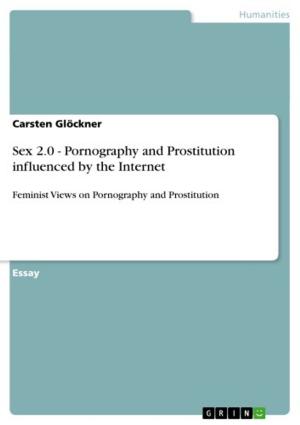English Romantic Poets and their Reading Audiences
Fiction & Literature, Literary Theory & Criticism, British| Author: | Karsten Runge | ISBN: | 9783638194808 |
| Publisher: | GRIN Publishing | Publication: | May 25, 2003 |
| Imprint: | GRIN Publishing | Language: | English |
| Author: | Karsten Runge |
| ISBN: | 9783638194808 |
| Publisher: | GRIN Publishing |
| Publication: | May 25, 2003 |
| Imprint: | GRIN Publishing |
| Language: | English |
Thesis (M.A.) from the year 2002 in the subject English Language and Literature Studies - Literature, grade: 1,3 (A), Ruhr-University of Bochum (Faculty for Philology), 65 entries in the bibliography, language: English, abstract: The late eighteenth and early nineteenth centuries were a time of accelerating cultural, social, economic, and political change. The outbreak of the French Revolution in 1789 and the passing of the first Reform Bill in 1832 are the political cornerstones of an age that saw the promotion of human rights and civil liberties against established systems of absolutist governments and limited possibilities of political participation. Democratic ideas that form the constitutional basis of modern Western societies were developed and circulated in a highly-charged political and cultural climate, represented, defended and contested in a bourgeois public sphere that had only come into being as a space of rational contestation in England in the century between the Glorious Revolution and the French Revolution.1 In philosophy, perhaps the most far-reaching development in the eighteenth century was the exploration of the individual psyche. John Locke's empiricist epistemology was based on the idea that the mind of the infant is like a tabula rasa and that there are no innate ideas or moral principles. Instead, Locke argued, the individual's knowledge springs from his or her own sensory perceptions. This epistemology carried with it a serious social problem: in effect perceivers were deprived of shared views and, isolated in their own perceptions, were cut off from the environment that had produced their knowledge. 'Equally isolated from objects and from others, Lockian perceivers can be certain of only their individual mental processes. [...] Certainty, knowledge, and truth become, at best, relational.'2 The problem of the individual's position in and relation to a society that was already perceptibly fragmenting as a result of economic developments and increased social mobility was debated by philosophers throughout the eighteenth century. David Berkeley, the Earl of Shaftesbury, and Adam Smith all in their own ways tried to find a solution to the empirical dilemma they had inherited from Locke and sought to relocate the individual in a social context.3 [...] 1 Cf. Jürgen Habermas, Strukturwandel der Öffentlichkeit: Untersuchungen zu einer Kategorie der bürgerlichen Gesellschaft (Neuwied: Luchterhand, 1962). 2 Regina Hewitt, Wordsworth and the Empirical Dilemma (New York et al.: Peter Lang, 1990), 5f. 3 Ibid., 7-32.
Thesis (M.A.) from the year 2002 in the subject English Language and Literature Studies - Literature, grade: 1,3 (A), Ruhr-University of Bochum (Faculty for Philology), 65 entries in the bibliography, language: English, abstract: The late eighteenth and early nineteenth centuries were a time of accelerating cultural, social, economic, and political change. The outbreak of the French Revolution in 1789 and the passing of the first Reform Bill in 1832 are the political cornerstones of an age that saw the promotion of human rights and civil liberties against established systems of absolutist governments and limited possibilities of political participation. Democratic ideas that form the constitutional basis of modern Western societies were developed and circulated in a highly-charged political and cultural climate, represented, defended and contested in a bourgeois public sphere that had only come into being as a space of rational contestation in England in the century between the Glorious Revolution and the French Revolution.1 In philosophy, perhaps the most far-reaching development in the eighteenth century was the exploration of the individual psyche. John Locke's empiricist epistemology was based on the idea that the mind of the infant is like a tabula rasa and that there are no innate ideas or moral principles. Instead, Locke argued, the individual's knowledge springs from his or her own sensory perceptions. This epistemology carried with it a serious social problem: in effect perceivers were deprived of shared views and, isolated in their own perceptions, were cut off from the environment that had produced their knowledge. 'Equally isolated from objects and from others, Lockian perceivers can be certain of only their individual mental processes. [...] Certainty, knowledge, and truth become, at best, relational.'2 The problem of the individual's position in and relation to a society that was already perceptibly fragmenting as a result of economic developments and increased social mobility was debated by philosophers throughout the eighteenth century. David Berkeley, the Earl of Shaftesbury, and Adam Smith all in their own ways tried to find a solution to the empirical dilemma they had inherited from Locke and sought to relocate the individual in a social context.3 [...] 1 Cf. Jürgen Habermas, Strukturwandel der Öffentlichkeit: Untersuchungen zu einer Kategorie der bürgerlichen Gesellschaft (Neuwied: Luchterhand, 1962). 2 Regina Hewitt, Wordsworth and the Empirical Dilemma (New York et al.: Peter Lang, 1990), 5f. 3 Ibid., 7-32.















